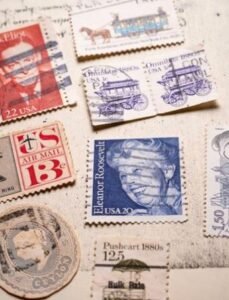The world of stamps has long been a source of fascination for collectors, but the terms philately vs. stamp collecting are often used interchangeably, despite representing two distinct approaches to the hobby. While both involve the collection of postage stamps, one is considered a true hobby, with deep intellectual engagement and long-term value, while the other can sometimes be seen as a fleeting obsession. In this article, we’ll explore 5 reasons why philately is a true hobby, while stamp collecting is a passing interest.
1. Depth vs. Superficial Interest
One of the most significant differences between philately vs. stamp collecting is the level of engagement each involves. Philately is not just about collecting stamps; it is the study of stamps. A philatelist is typically interested in learning about the historical, cultural, and artistic significance of each stamp. They explore the history behind stamp designs, printing techniques, the evolution of postal services, and the unique aspects of stamp issues. Philatelists often specialize in specific areas such as postal history, rare stamps, or thematic collections, which allows them to develop deep expertise in their areas of interest.

On the other hand, stamp collecting is often more about accumulating stamps. While many collectors may enjoy acquiring stamps from different countries, completing sets, or focusing on a particular time period, they generally do not delve into the deeper meanings or histories behind the stamps. As a result, stamp collecting can sometimes feel more like an obsession, driven by the thrill of acquiring more stamps, without necessarily engaging with them on a deeper intellectual level. This more superficial approach lacks the comprehensive, scholarly focus of philately, which is more about enriching the collector’s understanding and knowledge.
2. Educational Value: Lifelong Learning vs. Short-Term Enjoyment
A major distinction between philately vs. stamp collecting lies in the educational benefits each provides. Philately encourages lifelong learning. Philatelists are continually researching different stamps, understanding the intricacies of stamp production, and learning about the historical and cultural contexts in which the stamps were issued. This makes philately an intellectually stimulating hobby that can expand a collector’s knowledge of history, art, geography, and printing technologies. Over time, philatelists often acquire expert-level knowledge in specific areas, which they share with others in the philatelic community.

Stamp collecting, on the other hand, is often driven by short-term enjoyment. Collectors may seek to complete their albums or acquire a specific set of stamps but may not take the time to research each stamp’s history or production. While it’s still a fun hobby, the educational value of stamp collecting is typically less than that of philately, as many collectors are not as invested in learning about the deeper significance of their collection. This can result in stamp collecting being a more temporary obsession, where the initial excitement fades once a collection is “finished.”
3. Focus and Purpose: A Lifelong Hobby vs. Immediate Satisfaction
The commitment level in philately vs. stamp collecting is another defining difference. Philatelists typically approach stamp collecting with a long-term focus. They carefully research, curate, and preserve their collections, often honing in on specific themes or rarities. The goal is to build a collection that holds both personal significance and long-term value. For a philatelist, stamp collecting is an ongoing journey, and the process of acquiring and learning about stamps never really ends.
In contrast, stamp collecting can be more about immediate satisfaction. Many collectors enjoy the thrill of acquiring a specific stamp or completing a collection, but once that goal is achieved, they may lose interest. Without the deeper engagement that comes with philately, stamp collecting can sometimes feel like a transient obsession, where the joy comes from “filling gaps” rather than developing a long-term passion or knowledge base.
4. Value and Investment: Long-Term Appreciation vs. Instant Gratification
One of the most noticeable differences between philately vs. stamp collecting is how each approach impacts the long-term value of a collection. Philately is often seen as an investment. A philatelist’s careful research and focus on rare, historically significant stamps can result in a collection that appreciates over time. The careful study of stamps—understanding which issues are rare or have historical importance—can lead to the acquisition of stamps that become highly valuable, sometimes even reaching prices at auction that far exceed their original face value.
In comparison, stamp collecting is usually more about instant gratification. While collectors may enjoy the idea of owning rare stamps or completing a collection, the focus is typically on quantity or novelty rather than investment potential. Stamp collectors often don’t consider the future value of their collection, making it more of a fun hobby that’s not necessarily tied to long-term financial appreciation. As a result, stamp collecting can feel like a passing obsession, especially if collectors are not actively seeking to build something of lasting value.

5. Community Engagement: Active Involvement vs. Casual Hobby
Another key difference between philately vs. stamp collecting is the level of involvement with the broader stamp-collecting community. Philatelists are often deeply engaged in the global philatelic community. They attend exhibitions, exchange knowledge with other collectors, participate in philatelic societies, and contribute to publications. This active involvement allows philatelists to form lasting relationships with other passionate collectors, further enriching their understanding of the hobby.
Stamp collectors, however, tend to be more casual about their involvement in the stamp-collecting community. While there are clubs and online forums, many stamp collectors do not actively engage with others or share their expertise. The lack of ongoing interaction and exchange of ideas can make stamp collecting feel more solitary and less fulfilling in the long run. Without the social aspect and shared learning experiences that come with philately, collectors may eventually lose interest, leading the hobby to fade into a temporary obsession rather than a lifelong pursuit.
Conclusion: Philately vs. Stamp Collecting
In the debate of Philately vs. Stamp Collecting, it’s clear that Philately stands out as a true hobby that demands commitment, intellectual engagement, and long-term value. A philatelist’s passion for research, learning, and preserving postal history creates a rich, rewarding experience that evolves. Stamp collecting, on the other hand, is often driven by immediate satisfaction and a desire to acquire, which can make it feel more like a fleeting obsession.

For those seeking a hobby that offers deep intellectual fulfillment, a sense of community, and the potential for long-term value, philately is the superior choice. However, both hobbies have their merits, and ultimately, it’s up to the individual to decide which approach resonates with their interests and goals. Whether you’re drawn to Philately’s scholarly approach or stamp collecting’s more casual enjoyment, both offer unique rewards for those who appreciate the beauty of stamps.




